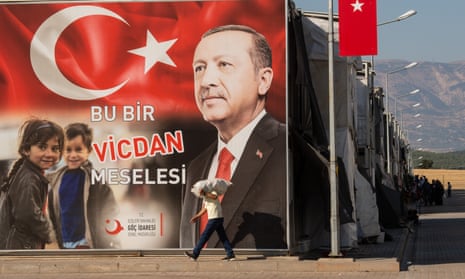Hundreds of Syrian refugees in Turkey have been compelled to return to their war-torn home country, some in handcuffs, after receiving threats of violence or being tricked into signing “voluntary return” agreements.
These are the claims contained in a hard-hitting report by Amnesty International, released on Friday, which claims to have documented at least 20 cases of forced illegal deportations by Turkish authorities.
Turkey is host to an estimated 3.6 million Syrians who have fled war in the neighbouring country, a situation that has increasingly become a domestic political headache for the country’s president, Recep Tayyip Erdoğan.
Erdoğan warned, before launching Turkey’s military incursion against Kurdish forces in northern Syria formerly allied with the US in the fight against Islamic State, that he planned to resettle 2 million people in a “safe zone” along the border.
The Amnesty report comes hard on the heels of the controversial decision by Donald Trump to lift sanctions imposed against Turkey after the country launched its campaign.
On Sunday, Erdoğan warned that Turkish forces would crush Kurdish militia fighters if they did not withdraw from the “safe zone” under a fragile truce agreement that has been marked by continuing clashes.
The claims about deportations that took place ahead of the Turkish military’s incursion have raised serious concerns over how Syrians might be persuaded to return. This is despite the €6bn (£5.2bn)deal signed with the EU in 2016, in which Europe agreed to help Turkey with the costs of hosting the refugees.
While it is illegal to forcibly deport people to Syria, as it exposes them to a real risk of serious human rights violations, Turkey claims that all those who return to Syria do so voluntarily. Turkish officials say 315,000 people have left for Syria on a voluntary basis.
However, according to the report, which interviewed Syrian deportees between July and September, Turkish authorities took handcuffed refugees back to Syria on buses before creating the “safe zones”.
Some of the people to whom researchers spoke said they were beaten or threatened with violence to force them to sign “voluntary return” documents. Others were told they were signing a registration document, a confirmation of having received a blanket from a detention centre, or a form that expressed their desire to remain in Turkey.
While the report admits there are no official statistics on such deportations, it suggests, based on dozens of interviews, that the number of illegal deportations may amount to hundreds, and that many people were coerced or misled when signing “voluntary return” documents.
The Amnesty report confirms already mounting evidence of a crackdown on Syrian refugees inside Turkey since the summer. Many refugees describe being stopped by police officers in train stations and other public places and asked to show a Turkish ID card, known as the “kimlik”.
Among the cases highlighted in the report is that of Qasim (not his real name), a 39-year-old father from Aleppo. He said he was detained in a police station in the Turkish city of Konya for six days, where officers reportedly told him: “You have a choice. One or two months, or a year, in prison – or you go to Syria.”
In a second case, John, a Syrian Christian, told a similar story, alleging that Turkish migration officials told him: “If you ask for a lawyer, we will keep you six or seven months, and we will hurt you.”
He was deported after being caught by the Turkish coastguard while trying to get to Greece, and said that after arriving in Syria he was detained for a week in Idlib by Hayat Tahrir al-Sham, an Al-Qaida-linked group formerly known as al-Nusra Front. “It was a miracle I got out alive,” he said.
Anna Shea, Amnesty International’s researcher on refugee and migrant rights, said: “It is chilling that Turkey’s deal with Russia this week agrees to the ‘safe and voluntary return’ of refugees to a yet to-be-established ‘safe zone’.
“Returns until now have been anything but safe and voluntary – and now millions more refugees from Syria are at risk.”
“Turkey’s claim that refugees from Syria are choosing to walk straight back into the conflict is dangerous and dishonest. Our research shows that people are being tricked or forced into returning,” she added.
“Turkey deserves recognition for hosting more than 3.6 million women, men and children from Syria for more than eight years, but it cannot use this generosity as an excuse to flout international and domestic law by deporting people to an active conflict zone.”
